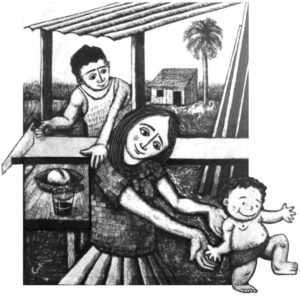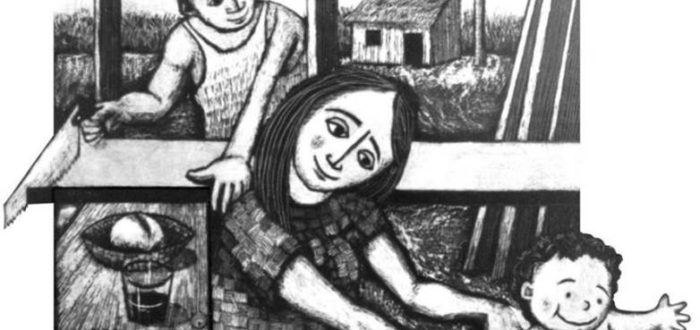
Con motivo de la convocatoria del EXCO en torno a dos preguntas sobre la situación de la pandemia del COVID-19 en nuestros países: 1) ¿Cómo está interpretando CVX lo que se está viendo y viviendo sobre la pandemia en vuestros países y el mundo? y 2) ¿Cómo puede la CVX ayudar en los procesos que está provocando la pandemia y en el consiguiente cambio histórico?, la CVX en Paraguay ha generado un foro abierto a través de las redes sociales (wasap principalmente), recogiendo y sistematizando diversos aportes de Asunción (Capital) y Encarnación (sur del país).
A continuación, los aportes:
Porque momentáneos y leves son los sufrimientos que a cambio nos preparan para un caudal eterno de gloria, a nosotros que ponemos la esperanza en las cosas que no se ven». *2 Cor 4*
Miramos a la CVX mundial y vemos que, gracias a nuestra espiritualidad ignaciana, que bebe de los EE.EE., por gracia y no por méritos, vamos intentando vivir la pandemia en prácticamente todo el mundo, conscientes de nuestra vulnerabilidad, desde nuestros miedos y angustias; así como también desde nuestras esperanzas y alegrías compartidas en familia y en comunidad, como una oportunidad para reforzar esos lazos que unen a pesar de la distancia.
Desde una fe en el Dios de Jesús, ante tanta visión fundamentalista dentro mismo de nuestros grupos eclesiales, de una imagen de un dios mago, de un dios castigador, nos sentimos llamados a dar razón de nuestra fe, saliendo al paso, anunciando al Dios de Jesús en todos los ambientes donde nos toca actuar, llevando y transmitiendo la paz y por sobre todo animando a confiar en el Dios misericordioso y presente en todo momento de nuestra historia.
Se da una crisis sanitaria y emocional, espiritual, lo que motiva a ser apoyo, y aportar desde cada lugar, en los momentos difíciles en los que se necesita del otro y más ahora que la cuarentena nos toca en un tiempo de Cuaresma. Esto interpretamos como una llamada de Dios a la conversión, a trabajar nuestra actitud en bien de nuestro prójimo, a involucrarnos más con las necesidades de los más pobres y ahondar en nuestra fe, en nuestro sentir con y para Cristo.
Creemos que el ser “realistas esperanzados” y “tener los ojos fijos en Jesús” son nuestro horizonte permanente, la utopía que podemos aportar a todas las fronteras en este momento histórico. Confiar plenamente en el Dios misericordioso, que nos ama y que sigue soñando, teniendo proyectos de plenitud para cada uno, independiente del país, condición social o género. Descubrir estos proyectos y “actuar como si todo dependiera de nosotros, sabiendo y confiando en que todo depende de Dios”.
Por otra parte, estamos en un tiempo de cambio profundo, de una mirada hacia adentro de uno mismo, para poder servir al otro con amor sincero. Esa mirada con la mano de Jesús que deja que sea él que conduzca ese viaje a nuestro verdadero ser, que espera de nosotros como personas y como miembros de una comunidad: sentir profundo y verdadero deseo de encontrar a Dios en todo.
Sobre las cosas materiales: aprendiendo a ser libres, comprender el amor, Su amor inmenso que nos contiene, y ser voz de los más necesitados, llevar esperanza en el dolor por las pérdidas humanas.
En este proceso histórico podemos ser instrumento o medio de Dios para llegar a todos los que de alguna forma están clamando por su salud espiritual, lo que implica una disponibilidad y formación continua y el día después, todo esto sea distinto y los cambios como sociedad que se den en el sistema de salud, educación y buscando la equidad y justicia social, Dios está en esta oportunidad de abrir los ojos hacia los demás.
¿Cómo puede la CVX ayudar en los procesos que está provocando la pandemia y en el consiguiente cambio histórico?
Surge la idea del Kairós, tiempo en tanto oportunidad, tiempo propicio para volver a Dios.
Nos invita también a discernir lo realmente importante, qué ponemos primero en mente en los tiempos de dificultad: ¿Jesús y su mensaje de salvación y esperanza o la desesperación por la realidad que estamos viviendo? Y esa invitación a centrarnos en Cristo, pero sin dejar de lado el contexto que nos toca enfrentar, ser contemplativos en la acción, característica principal de nuestra espiritualidad.
No como profetas de calamidades, sino como cristianos con esperanza, conscientes de la realidad que nos impacta de manera globalizada a todos, y que más que nada, nos muestra que hemos sido creados interdependientes, que nos necesitamos los unos a los otros y que la empatía y la solidaridad, así como la búsqueda de justicia, son los valores para fomentar.
Cuidar y filtrar la información de manera a que lo compartido sea de fuentes confiables y enfocado a un mensaje de esperanza dentro de la crisis; también la manera en la que buscamos, encontrarnos aprovechando los distintos medios, saliendo de lo que estamos acostumbrados, pero adaptándonos a la situación y sobre todo ese estar «unidos en oración» sentido por la comunidad. Estamos en un tiempo que puede ser propicio para ahondar en nosotros mismos y profundizar los lazos, los vínculos, y generar una red solidaria fuerte y, ojalá, duradera.
A partir de este amor, salir al mundo, porque sabemos que el volver a empezar será bastante difícil sobre todo para los más vulnerables, estar atentos a las necesidades del otro, aportando a superar la crisis sanitaria. Puede ayudar en el proceso brindar mensajes de fe y esperanza, animando a los miembros a centrarse en Dios y su amor que supera las dificultades.
Ser conscientes de la manera de reaccionar ante los acontecimientos, ponerles nombre, entrenarse a tomar distancia de ellos, para ser transformados por todo lo que ocurre. Esto implica hacer uso de herramientas que nuestra espiritualidad pone a disposición de todos (Pausa, EE.EE, acompañamiento pastoral de la escucha).
En un sentido de asistencia, servicio de manera práctica, ofrecer información veraz y oportuna como prioridad; asimismo, disposición para realizar servicios en lugares y personas concretas (turnos para cocineros en el comedor de ancianos, profesores de apoyo para clases de recuperación, recolección de abrigos, etc.) de manera a saber ver dónde hacemos falta y, dependiendo de los dones y posibilidades, saber y estar dónde debemos ir y ayudar.
Que las comunidades locales definan de manera concreta qué o cuál de las Fronteras definidas en la Asamblea de Líbano (Familia, Juventud, Ecología, Globalización y Pobreza) es la que al interior de la propia comunidad, y a nivel país, necesitan un acompañamiento más cercano y profundo, de modo tal que las palabras claves de la Asamblea de Buenos Aires, de Profundizar, compartir y salir, se hagan “Encarnación” en esa frontera.
Muchas personas sienten temor, incertidumbre, desesperanza por lo que está ocurriendo, por lo que en las fronteras Familia y Juventud, tener disposición para ayudar desde la escucha y tratar de calmar a través de la comprensión, dando una palabra de aliento en los procesos de aceptación, transformación y crecimiento que requerirán un acompañamiento a todo lo que, de temores, ansiedades, faltas de trabajo, enfermedad y muerte, esta pandemia puede traer.
Orar, aprovechar este tiempo en casa para tomarnos una pausa y reflexionar, conectarnos con Dios, ir entrando en clima de semana Santa, invitar a nuestra familia a que también lo haga, entregar toda esta situación a Dios y sobre todo agradecerle por tanto bien recibido, contemplarle no solo en la pandemia, sino también en lo positivo, en los motivos que tenemos para dar las gracias. Traer a la memoria a los jesuitas y cevequianos que nos han precedido y que hoy ya están con el Padre, traerlos presente en el encuentro, en memoria.
Unidos, cercanos cada comunidad de base y a la comunidad grande, participar con más fuerza desde lo que se pueda aportar para el cambio que ya se está iniciando. Debemos estar muy presentes ante las injusticias. Se impone ayudar en los sectores más vulnerables.
Es tiempo de una “ruta samaritana”, con tantos abandonados al costado del camino, de poner en práctica lo aprendido, lo que decimos con tanta facilidad como ser familia, amar más, compartir, agradecer, es una oportunidad de volvernos más humanos.
CVX Paraguay, 2 de abril de 2020
CLC PARAGUAY, 2020.
Following the call of the EXCO around two questions on the situation of the COVID-19 pandemic in our countries: 1) How is CLC interpreting what is being seen and lived about the pandemic in your countries and in the world? and 2) How can CLC help in the processes that are causing the pandemic and the consequent historical change? CLC in Paraguay has generated an open forum through social networks (mainly Whatsapp), collecting and systematizing various contributions from Asuncion (Capital city) and Encarnacion (South of the country).
Here are the contributions:
For our light and temporary affliction is producing for us an eternal glory that far outweighs our troubles. So we fix our eyes not on what is seen, but on what is unseen. (2 Cor. 4).
We look at the CLC worldwide and see that, thanks to our Ignatian spirituality, that drinks from the Spiritual Exercises, by grace and not by merit, we are trying to live the pandemic in practically the whole world, aware of our vulnerability, from our fears and anguish; as well as from our hopes and joys shared in family and community, as an opportunity to strengthen those bonds that unite in spite of the distance.
From a faith in the God of Jesus, in the face of such a fundamentalist vision within our ecclesial groups, of an image of a magician god, of a punishing god, we feel called to give an account of our faith, going out in the open, announcing the God of Jesus in all the places where we have to act, bringing and transmitting peace and above all encouraging trust in the merciful God who is present at every moment of our history.
A sanitary, emotional and spiritual crisis occurs, which motivates us to be supportive, and to contribute from each place, in the difficult moments in which we need each other and even more now that the quarantine reaches us in time of Lent. We interpret this as a call from God to conversion, to work on our attitude for the good of our neighbor, to become more involved with the needs of the poorest and to deepen our faith, our feeling with and for Christ.
We believe that being “hopeful and realists” and “having our eyes fixed on Jesus”, are our permanent horizon, the utopia that we can bring to all frontiers at this historical moment. To trust fully in the merciful God, who loves us and who continues to dream, having projects or fulfillment for each one, regardless of country, social condition or gender. To understand these projects and “act as if everything depended on us, knowing and trusting that everything depends on God.”
On the other hand, we are in a time of deep change, of a look inside oneself, to be able to serve the other with sincere love. That look with the hand of Jesus that lets Him lead that journey to our true being, that expects from us as persons and members of a community: to feel a deep and true desire to find God in everything.
As for material things: learning to be free, understanding love, His immense love that sustains us, and being a voice for the most needy, bringing hope in the pain of human losses.
In this historical process we can be an instrument or means of God to reach all those who in some way are clamoring for spiritual health, this implies a continuous availability and formation, and the day after, all these will be different and the changes as a society that will occur in the health system, education and the pursuing of equity and social justice, God will be in this opportunity of opening the eyes to others.
¿How can CLC help in the processes that are causing the pandemic and the consequent historical change?
The idea of Kairos arises, times as opportunity, time to return to God.
It also invites us to discern what is really important, what we put first in our minds in times of difficulty: Jesus and his message of salvation and hope or the hopelessness of the reality we are living? And that invitation, to focus on Christ, but without leaving aside the context that we have to face, to be contemplative in action, which is the main characteristic of our spirituality.
We are not prophets of calamities, but Christians with hope, aware of the reality that impacts us all in a globalised way, and that more than anything, it shows us that we have been created interdependently, that we need each other and that empathy and solidarity, as well as the search for justice, are the values to be promoted.
Taking care and filtering the information so that what is shared is from reliable sources and focused on a message of hope within the crisis, also the way in which we seek, to find ourselves taking advantages of the different means, going beyond what we are used to, but adapting ourselves to the situation, and above all, that being “joined in prayer” felt by the community. We are in a time that can be propitious to deepen in ourselves and to deepen the bonds, the links, and to generate a strong and hopefully lasting solidarity network.
It is from this love that we will go out into the world, because we know that starting over will be quite difficult, especially for the most vulnerable, to be attentive to the needs of others, contributing to overcome the health crisis. The process can be more bearable by providing messages of faith and hope, encouraging members to focus on God and his love that overcomes difficulties.
Being conscious of the way we react to events, give them a name, train oneself to distance from them, to be transformed by everything that happens. This implies making use of the tools that our spirituality makes available to all (pause, spiritual exercises, companionship, and pastoral care of listening).
In a sense of assistance, service in a practical way, offering truthful and opportune information as a priority, as well as willingness to carry out services in specific places and with specific people (shift for cooks in the elderly dining room, support teachers for remedial classes, collection of winter coats, etc.) so as to know where we are needed and, depending on the skills and possibilities, to know and be where we should go and help.
May the local communities define in a concrete way which of the frontiers defined in the Assembly in Lebanon (Family, Youth, Ecology, Globalization and Poverty) is the one within the community itself, and at the country level, needs a closer and deeper support, so that the key words of the Assembly in Buenos Aires, of Deepening, sharing and going out, become “incarnated” in that frontier.
Many people feel fear, uncertainty, and despair because of what is happening, so at the frontiers of Family and Youth, have a disposition to help from listening and try to calm through understanding, giving a word of encouragement in the processes of acceptance, transformation and growth that will require support for all that this pandemic may bring of fears, anxieties, lack of work, illness, and death.
To pray, to take advantage of this time at home to take a break and to reflect, to connect with God, to enter into an atmosphere of Holy Week, to invite our family to do the same, to give all this to God and above all, to thank Him for so much good that has been received, to contemplate Him not only in the pandemic, but also in the positive, in the reasons that we have to give thanks. Recalling the Jesuits and the Christian Live Community members that preceded us and that today are already with the Father, bringing them to the meeting, in memory.
United, close to each base community and to the larger community, participate with more strength with what can be contributed to the change that has already begun. We must be present in the face of injustice. Help is needed in the most vulnerable sectors.
The time has come for a “Samaritan route”, with so many abandoned on the side of the road, to put into practice what we have learned, what we say with such ease as being a family, loving more, sharing, giving thanks, it is an opportunity to become more human.
Everything is possible with the strength of the Risen Lord.
CLC Paraguay, April 2nd, 2020.



